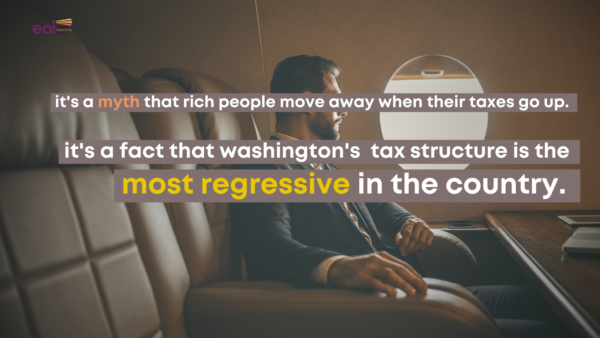
Photo by Oriana Polito
If you’re planning a vacation this summer, there’s a good chance you’ll be boarding a commercial airplane. As you take off your shoes and place your laptop into the bin, you may find yourself thinking about how much easier it must be for the ultra-rich to see the world. Aboard their private jets, destined for remote locations, billionaires must be more mobile than the rest of us. It’s no wonder, then, that when taxes and regulations present an inconvenience, the rich often threaten to up and move. This idea is called “wealth flight,” and it’s a common threat whenever anyone proposes taxing the wealthy.
Is wealth flight really a valid concern?
In the 2023 session, Washington lawmakers proposed a tax on the financial wealth of the very rich. The tax would fund critical investments, including education. Thousands of Washingtonians came out to show their support. They delivered heartfelt testimony about the many reasons our state needs to fix our tax structure. They implored elected officials to finally take a step to fix our broken system.
And yet, the popular policy never made it to the Governor’s desk.
The wealth tax didn’t pass, but not because the arguments weren’t persuasive or because our state doesn’t desperately need tax reform. Instead, one big concern for legislators was the possibility that Washington’s wealthy would move out of state.

This isn’t surprising. Wealth flight is an age-old concern. Its looming presence has prevented governments from increasing taxes on the very rich for decades. But how valid is it?
The worry is that, if rich people are able to easily relocate in the event that their taxes go up, the state would lose whatever revenue they already derive from those individuals and their business. But this isn’t exactly a founded fear.
Billionaire mobility isn’t quite as fluid as most people think. Sure, the rich can fly away on a G6, but that doesn’t mean they’re uprooting their lives and businesses. And even if it were, the well-being of the super-rich doesn’t reflect on the health of the state’s economy. There’s ample evidence that fighting to keep the wealthy from fleeing doesn’t ensure economic growth. Instead, as we’ve seen in Washington, it upholds a regressive tax system that harms the vast majority of the state’s residents.
How Worried Should We Be About Wealth Flight?
While there are a lot of things legislators should be concerned about, the out-of-state migration of Washington’s extremely wealthy is not one of them. Research and a hefty dose of the real-world evidence suggest that taxing the rich will not result in an exodus of the wealthy.
- Billionaires move more than poor people, right? Didn’t Elon Musk just move to Texas? In his book “The Myth of Millionaire Tax Flight: How Place Still Matters,” Cornell professor Cristobal Young shows us that the highly-mobile billionaire is an exemption to the rule. In fact, just like the rest of us, the extremely wealthy (even billionaires) are socially embedded in the places where they made their wealth. Where people live is about lifestyle, social clout, and family.
- Isn’t Seattle already dying, even without passage of the state wealth tax? Won’t this hurt the city and state? These fears can be laid safely to rest. Seattle is doing just fine and was named the fastest growing big city in data released by the U.S. Census Bureau in 2023.[i] The Department of Revenue (which would administer the state wealth tax) analyzed data. They found that most of the people who’d pay the state wealth tax live on the west side of the state, with a majority living in King County.[ii] Only around 700 individuals in Washington would qualify to pay the state wealth tax, wherein financial assets valued above $250 million in value are taxed at a rate of 1%. A more valid worry is that Washington is a place that relies on lower-income people to balance the budget, while taxing the wealth of the ultra-rich at a much lower rate. It’s not that Seattle is “dying” because the wealthy pay too much in taxes. If anything, it’s because they don’t pay enough, leaving our social services without ample funding.
- Is this proven? What happened when other states increased taxes on the wealthy? New Jersey provides a natural experiment. In 2004, they introduced a new tax bracket for those earning more than $500,000 a year, raising the top marginal rate by 2.6%. Researchers studied the migration of millionaires impacted by the new tax rate.[iii] The found that, compared to the 96th – 99th percentiles of the income distribution, who were not subject to the new tax, those subject to the new tax (the 99th percentile of income earners in New Jersey), moved in and out of the state at similar rates. While some millionaires did leave the state, their impact was negligible. The public dollars New Jersey gained from the tax increase on high earners was billions of dollars – the millionaires who left reduced public revenue by a tiny 0.4%.[iv]
- Ok but, the wealthy have private planes. Won’t it be easy for them to move when they want? Research on migration patterns by income shows that while the wealthy are definitely taking more vacations than you, the poorer you are, the more likely you will move from one state to another in a given year. In fact, the poorest US residents are about twice as likely to move in a year than a millionaire.[v](Oh, and let’s not overlook the impact of those same private jets. According to an analysis of carbon footprints by income, the richest 0.1 percent of the population are super polluters, emitting ten times more carbon than the next 10% of the wealthiest [vi] ).
Vacationing is easy when you’re rich. You don’t need to request time off when you make money while you sleep.
But vacationing isn’t the same as moving.
While regular people make their money from working and their wealth is mostly tied up in the value of their home, the extremely rich typically make their income from financial assets (corporate stocks and bonds) and hold their wealth in the value of those assets. Your home is taxed annually through the state property tax.
In contrast, the wealth of the super-rich held in financial assets isn’t taxed at all at the federal or state level during a person’s lifetime. We can change this- but not if we’re too afraid of hurting the feelings of the very rich.
Legislators cry poor when it comes to funding basic things like food for students at public schools. But a solution for helping fund the public good is on the table. We can raise billions of dollars a year for the basic programs and services we all rely on by taxing the wealth of Washington’s multi-millionaires and billionaires. If we do this, some of them might move. But the billions of dollars we raise from this new tax will help make our state a better place, where people who do live here can better enjoy their lives with their friends and family.
Citations:
[i] https://www.seattletimes.com/seattle-news/data/seattle-is-once-again-the-fastest-growing-big-city-census-data-shows/
[ii] https://www.opportunityinstitute.org/blog/post/where-is-the-wealth-in-washington/
[iii] https://citeseerx.ist.psu.edu/document?repid=rep1&type=pdf&doi=2a67742688691371703cf3aa55d8c7677ca6490a
[iv] https://www.cbpp.org/research/state-budget-and-tax/tax-flight-is-a-myth
[v] https://www.theguardian.com/inequality/2017/nov/20/if-you-tax-the-rich-they-wont-leave-us-data-contradicts-millionaires-threats
[vi] https://www.nytimes.com/2023/02/28/climate/climate-change-carbon-footprint-america.html
More To Read
March 20, 2024
I-2111: The Income Tax Ban Is A Spectacle, but One We Can’t Ignore
A way to waste time, energy, and money, I-2111 is costing more than just taxes
February 2, 2024
What is REET and Why Do We Need to Reform It?
Washington State lawmakers have the chance to make a progressive tax more progressive and provide a permanent funding source for affordable housing
January 23, 2024
Report: Washington no longer has the most regressive tax structure in the nation
This is both cause for celebration and a call to action
